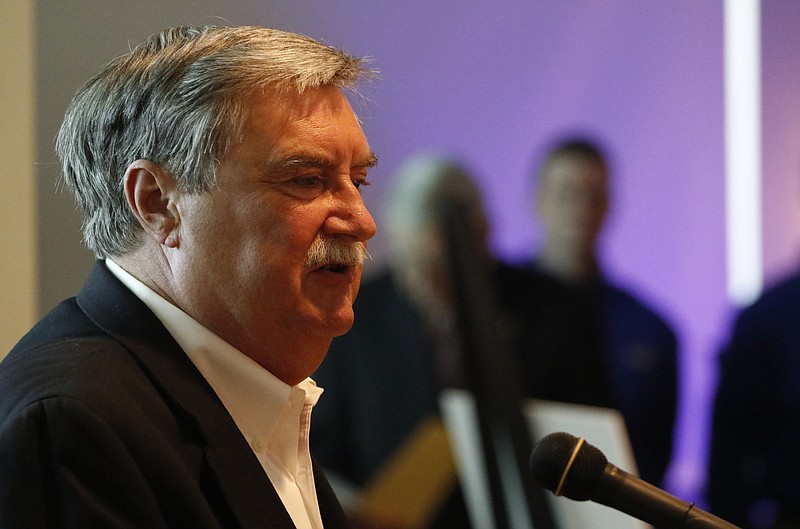EPB leaders
Since its creation in 1938, the Electric Power Board of Chattanooga has only had six leaders.* S. R. Finley - 1938-1963* George Parker - 1963-1964* C. B. Johnson - 1964-1971* John S. McQueen - 1971-1982* Ken Baxter - 1982-1996* Harold E. Depriest - 1996-2016
Harold DePriest, the EPB head who led the city-owned electric utility to gain global acclaim as the world's fastest internet provider and one of the best-rated customer service utilities in America, is retiring next month.
DePriest announced today he will step down at the end of August as CEO of Chattanooga's Electric Power Board, which he first joined as a junior engineer in 1971. The 67-year-old engineer is only the sixth leader of EPB since its creation by the city of Chattanooga in 1938 as one of TVA's biggest power distributors.
During his two decades as head of EPB, DePriest more than doubled company revenues and expanded the utility from an electric monopoly to a competitive telecommunications provider, electricity supplier and key player in Chattanooga's emerging innovation economy.
The EPB board has yet to designate a successor to DePriest as CEO. But David Wade, a 33-year engineer at EPB, was named president and chief operating officer in February and is expected to move into the top job at the utility this fall.
"We've been fortunate to have leaders who have stayed with EPB and helped build the business and our team," said EPB Chairman Joe Ferguson, who has served on the board that oversees EPB for more than two decades and voted to promote DePriest to CEO in 1996. "Harold has been especially helpful in building the culture and team we now have at EPB."
DePriest said when he became EPB president in 1996, the utility was an engineering-driven organization that operated in separate silos across the business.
"A lot of what we did was to take down the barriers between people and get them talking to one another to build a more customer-focused organization," he said. "We also started focusing on the future, rather than the past. When you focus on the past, people tend of focus on aches and pains, but when you look to the future, people can concentrate on the possibilities and opportunities."
At the urging of then Mayor Bob Corker, DePriest and his team quickly saw the potential of the fiber optic network the utility initially sought to build to upgrade communications and reliability for the electric grid. Building a smarter grid also opened up the chance to build a fiber optic telecommunications system for high-speed internet, television and telephone service to every home and business served by EPB.
Despite legal challenges to the move by cable TV competitors and complaints by some government critics worried about ratepayers having to bail out a costly failure, EPB entered the telephone business in 2000 and decided to launch a citywide fiber-optic communications system a decade later. With the backing of a $111.6 million federal stimulus grant, EPB issued $220 million of bonds - the biggest debt ever for the city utility - and laid a fiber network across its 600-square-mile service territory.
That venture ultimately led Chattanooga to become the first city in the Western Hemisphere to offer gigabit-per-second internet speed to an entire community, earning Chattanooga its newest title as "Gig City." EPB has attracted nearly 84,000 telecom subscribers, generating enough revenue to not only pay for the communications services but help generate enough funds to lower electric bills.
"We estimate that the fiber-optic system has helped us avoid at least a 5 percent rate increase," Ferguson said Thursday in a meeting with reporters and editors at The Chattanooga Times Free Press. "It has worked out better than we ever imagined and a lot of the credit goes to Harold and the team he put together."
The fiber-optic service has attracted delegations from a half dozen cities around the globe this year from other cities interested in seeing how Chattanooga built a smart grid and fiber-optic communications network for both power and communications.
This spring, Consumer Reports rated EPB as the No. 1 utility in America for customer service based upon reader responses and ratings of utilities.
"I don't know that we could have done what we did in any other city except Chattanooga, because our city was willing to come together, to try something new and to make it work," DePriest said.
Although the Tennessee Legislature has been reluctant to remove territorial limits on EPB and other public utilities expanding their communications services across the state, DePriest said he remains hopeful more cities can replicate what Chattanooga has accomplished.
"At first, our critics complained that our fiber-optic system would fail and cost ratepayers and taxpayers extra money," DePriest said. "That never happened and now they seem to complain that we are so successful that somehow we are threatening other companies."
Under DePriest as CEO, EPB total revenues grew from $310 million in 1996 to $683.8 million this year, including $122.7 million related to fiber.
Even with that expansion, however, DePriest noted that AT&T is 1,200 times bigger than EPB and Comcast is 680 times bigger.
"We're way ahead of our projections and, most importantly, I think we've brought a real competitive advantage for Chattanooga that we are already building on for the future," Ferguson said.
Contact Dave Flessner at dflessner@timesfreepress.com or at 423-757-6340.
